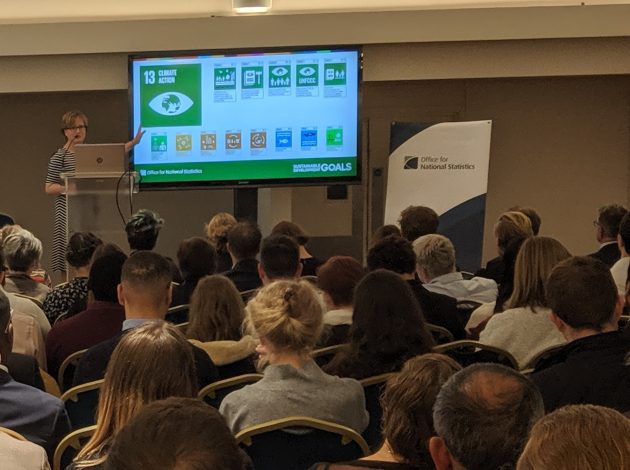The United Nations Sustainable Development Goals are a global initiative that pledges to achieve a better and more sustainable future for all. The ONS has a leading role in the UK’s response and is now busy measuring our progress towards achieving each of the seventeen goals. As Fiona Dawe explains, measuring the social impact of climate change is emerging as a key theme of the work and was the subject of special ONS conference this week.
“In 2015, the world signed up to take action to end poverty, protect the planet and ensure that all people enjoy peace and prosperity by 2030 – through the United Nations Sustainable Development Goals (SDGs).
Together the 17 Goals cover all the issues that our planet and global population is facing. Achieving any of the 169 individual targets that sit under the Goals is only part of the story – understanding how the issues interlink across and between Goals is the only way that the world can realise the SDG ambition by 2030.
The SDG Team at the ONS is responsible for sourcing and reporting the data for the UK. We’re breaking down the data for each of the indicators that’s so we can bring the SDGs to life and realise the power of the SDG framework to understand the social impact of the Goals in the UK and Globally. You can see how that’s progressing here on the UK reporting platform website.
As well as having a Goal devoted to Climate Action (Goal 13), climate change and its impact on society are peppered throughout the SDGs – for example air pollution is considered under Goal 3 “Good Health and Well-Being”; Goal 9 “Industry, Infrastructure and Innovation”; and Goal 11 “Sustainable Cities and Communities”. Research and information about the causes and physical impact of climate change on the planet is in the news on a daily basis – but there is little public understanding of what this will mean for people, communities and vulnerable groups. Using the SDGs as a focus, ONS took a big step into this arena by hosting a Forum in Westminster to explore how data can provide insight into the social impact of climate change.
We started by considering the UK situation – the social, environmental and individual factors that heat waves, flooding and extreme weather will have on different groups. The panel members shared their research – Amy Dodd (Lancet Countdown); Sarah Lindley and John O’Neil (Manchester University) – and their data wish list. Questions from the floor highlighted the interest and need for more data-led information to inform understanding of the impact of climate change on different groups – ranging from the effect on social cohesion and resilience, and on individual well-being, to the need for a greater understanding of what problems future climate change may bring.
“SDGs are a comprehensive up-to-date vision for our future” said Baroness Sheehan, Liberal Democrat Lords Spokesperson for International Development, in her speech ahead of the second panel that focussed on the social impact of climate change globally. Our panel members gave insight from their different areas of expertise – Neil Briscoe (Department for International Development); Baroness Verma (UN Women UK); David Rhodes (Public Health England); and Amy Dodd (Development Initiatives). The discussion was wide ranging: the need to ensure that statistical and data collection techniques are country-led and do not start from an assumption that what works in the UK will work elsewhere; issues surrounding lack of official identity for over a billion people; and the need for evidence-based mitigation strategies that understand how to best drive the behaviour change needed by vulnerable groups to survive the effects of climate change.
This thought-provoking event ended on a positive note with Iain Bell (ONS, Deputy National Statistician) outlining the 3 key challenges for ONS and the audience to take forward – explaining complex stuff in a simple way to get maximum impact and change; the importance of intersectionality , the join up between the SDGs; and collaboration: Neither the ONS nor anyone else can do this alone.
Now the challenge begins – finding and using data that will help us to understand the social impact of climate change. Please contact the SDG Team if you are researching in this field and are able to help us in our challenge to source data that will mean that we truly Leave No One Behind.”
Fiona Dawe is Head of Sustainable Development Goals at the Office for National Statistics
